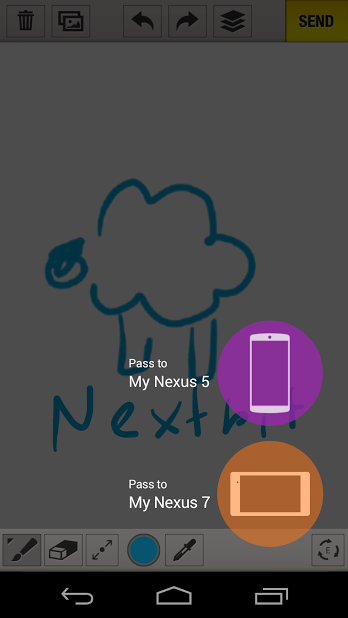The last time I talked to Nextbit, they had raised $18 million from Accel Partners and Google Ventures and had put together a veteran team made out of early Android folk who helped build Google’s mobile OS into what it is today. But they refused to share anything about what they were working on.
Now after building up a team of 22 people from Android, HTC and Dropbox, they’re willing to talk. Today, they unveiled a series of three products that will make it dead simple to seamlessly save the state of your mobile apps or data and switch between devices.
“It’s an accident of history that mobile platforms and the cloud evolved separately,” said Nextbit CEO Tom Moss, who led business development for Android when it was in its infancy and then went on to start and sell an enterprise mobile company called 3LM to Motorola. “If mobile had happened three years later, this is what it would have looked like.”
The first product is called Baton. It backs up and syncs the sum total of a person’s apps and data. That makes it easy to switch between, say, playing a game on a phone then tablet without having to re-start. It also helps people avoid losing their data if their phone is lost or stolen.
 Underneath the hood at Baton, is a syncing technology that stores the state of an app and its data so that you can easily switch from one device to another. They’ve created a UI flourish called “Pass” that lets you send the state of an app to another device, so that you don’t have to pick up another device, open it, find, download and then open that app on another device.
Underneath the hood at Baton, is a syncing technology that stores the state of an app and its data so that you can easily switch from one device to another. They’ve created a UI flourish called “Pass” that lets you send the state of an app to another device, so that you don’t have to pick up another device, open it, find, download and then open that app on another device.
“It creates a unified experience of your app state across any device,” said CTO Mike Chan, who developed a lot of the core power management technology for the earliest versions of Android. “From our standpoint, you also don’t have to change people’s behavior, and this product doesn’t require any developer support because it integrates so deeply into the operating system.”
The third product in the suite is something called ‘Backup and restore,’ which you could think of like a Dropbox-type of functionality, except if it were designed as a mobile-first experience. Backup and restore, which won’t come out until late next year, will automatically store all of your data and photos. Unlike the other two, you can presume it would probably be more of a freemium product, with paid tiers of extra storage.
“It’s what we’d like to call limitless storage,” Moss said. “You can just have your data.”
He added, “It’s an imperfect metaphor to compare it Dropbox. In that system, you have to have your folders and files. But who uses files and folders on mobile devices? With our design, you’ll just never see an insufficient storage error. Your data will will just sit where it needs to sit.”
Baton and its syncing technology are available for beta on Cyanogen, the Android mod that is reportedly spurring interest from investors at a $1 billion valuation. Notably, Moss is on the board of the company.